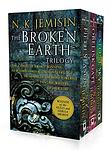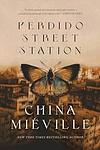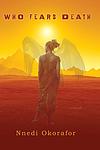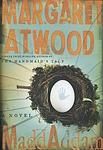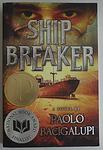The Greatest "Science fiction, Dystopian, Fiction" Books Since 2000
Click to learn how this list is calculated.
This list represents a comprehensive and trusted collection of the greatest books. Developed through a specialized algorithm, it brings together 300 'best of' book lists to form a definitive guide to the world's most acclaimed books. For those interested in how these books are chosen, additional details can be found on the rankings page.
Genres
Science fiction is a genre of literature that explores the potential consequences of scientific and other innovations on society and individuals. It often features futuristic or imaginary settings, advanced technologies, and scientific concepts that are not yet fully understood or realized. Science fiction can encompass a wide range of themes, including space exploration, time travel, artificial intelligence, and alternate realities. It is a genre that allows authors to speculate on the future of humanity and the impact of scientific progress on our lives.
Dystopian literature is a genre of speculative fiction that explores social and political structures in a dark, nightmare world. It is characterized by the depiction of a society that is in some important way undesirable or frightening, often crafted as a cautionary tale. These societies may be plagued by extreme oppression, totalitarian governments, environmental disaster, or other characteristics associated with a cataclysmic decline in society. Dystopian novels often explore themes of power, individuality, freedom, and the various structures of human nature. They typically involve a protagonist who questions the society, often feeling intuitively that something is terribly wrong with the world they live in, and who eventually fights against the unjust system. Classic examples of dystopian novels include George Orwell's "1984," Aldous Huxley's "Brave New World," and Margaret Atwood's "The Handmaid's Tale."
Countries
Date Range
Reading Statistics
Click the button below to see how many of these books you've read!
Download
If you're interested in downloading this list as a CSV file for use in a spreadsheet application, you can easily do so by clicking the button below. Please note that to ensure a manageable file size and faster download, the CSV will include details for only the first 500 books.
Download-
1. Never Let Me Go by Kazuo Ishiguro
The novel is a haunting tale of three friends, who grow up together at a seemingly idyllic English boarding school. As they mature, they discover a dark secret about their school and the purpose of their existence, which is to become organ donors for the rest of society. The story is a profound exploration of what it means to be human, the morality of scientific innovation, and the heartbreaking reality of love and loss.
-
2. Cloud Atlas by David Mitchell
This novel is a unique blend of six different stories, each set in a different time and place, spanning from the 19th century South Pacific to a post-apocalyptic future. Each tale is written in a different style, reflecting the time and setting it represents, and they are all connected through shared themes and recurring motifs. The stories are nested within each other, with each interrupted by the next, only to be concluded in the second half of the book. The novel explores themes of predacity, civilization, reincarnation and the eternal recurrence of the same behaviors throughout history.
-
3. The Hunger Games by Suzanne Collins
Set in a dystopian future, the novel revolves around a teenager named Katniss Everdeen, who lives in a post-apocalyptic nation where the government, in order to maintain control, forces each of its twelve districts to send a boy and girl to participate in a televised annual event. This event, known as the Hunger Games, is a fight to the death. When Katniss's younger sister is selected to participate, Katniss volunteers to take her place. The book follows her struggle for survival in the cruel game, against the backdrop of a brewing rebellion against the oppressive regime.
-
4. The Fifth Season by N. K. Jemisin
A woman searches for her kidnapped daughter in a world ravaged by a catastrophic climate change event known as the Fifth Season. Simultaneously, the narrative follows a young girl with destructive powers and a man struggling to control his own similar abilities. The story explores themes of oppression, survival, and the destructive power of nature, all set in a dystopian world where the earth is constantly in flux, and society is strictly divided and controlled.
-
5. Oryx and Crake by Margaret Atwood
Set in a post-apocalyptic world, the novel follows the life of Snowman, who believes he may be the last human on earth, as he struggles to survive in a new, harsh environment. He is surrounded by genetically modified creatures, and his only companions are the Crakers, human-like beings created by his brilliant but disturbed friend Crake. Through Snowman's memories, the story of how the world came to be this way is revealed, involving a love triangle with the mysterious Oryx and the catastrophic consequences of Crake's scientific experiments.
-
6. Station Eleven by Emily St John Mandel
"Station Eleven" is a post-apocalyptic novel that revolves around the lives of several characters before and after a devastating flu pandemic wipes out most of the world's population. The narrative jumps back and forth in time, exploring the interconnectedness of the characters' lives through their shared memories and experiences. The story also follows a traveling Shakespearean theatre company as they navigate the dangers of a collapsed civilization, emphasizing the importance of art and human connection in times of crisis.
-
7. The Broken Earth Trilogy by N. K. Jemisin
The Broken Earth Trilogy is a captivating science fiction series set in a post-apocalyptic world where a woman with the power to control seismic activity is on a quest to rescue her kidnapped daughter. This world, called the Stillness, regularly experiences catastrophic climate change events known as Seasons, which its inhabitants constantly prepare for. The series explores themes of oppression, survival, and the human capacity for adaptation, all while providing a thrilling and poignant narrative that keeps readers engaged from start to finish.
-
8. Ancillary Justice by Ann Leckie
The book is a science fiction novel that follows the story of Breq, who was once a powerful starship AI controlling many bodies, but is now trapped in a single human body and driven by a quest for vengeance. Set in a vast interstellar empire where ships and stations are inhabited by ancillary AIs, the narrative explores themes of identity, gender, and colonialism. Breq's journey intertwines with flashbacks to her past experiences as an AI, revealing her complex relationship with a former officer and the events that led to her current mission. As she navigates political intrigue and battles, Breq challenges the empire's rigid structures and seeks to address the injustices within it.
-
9. Perdido Street Station by China Mieville
In a sprawling steampunk metropolis teeming with bizarre creatures and arcane technologies, a gifted scientist unwittingly unleashes a nightmare upon the city. When his experiment with a rare caterpillar goes awry, monstrous, dream-eating moths are set loose, preying upon the citizens' minds and plunging the city into terror. As the scientist grapples with the consequences of his actions, a motley group of individuals, including a renegade artist, a wingless bird-man, and other outcasts, come together in a desperate attempt to save their city from the eldritch horrors that now haunt its shadowy streets. Their journey takes them through the city's various layers, from the opulent heights to the grimy depths, revealing the complex tapestry of cultures and conflicts that define this urban labyrinth.
-
10. Who Fears Death by Nnedi Okorafor
This novel is a coming-of-age narrative set in a post-apocalyptic Africa. It follows the journey of a young woman born from a violent act, who is prophesied to bring an end to a brutal regime. As she grows, she discovers her magical abilities and must learn to control them in order to fulfill her destiny. The narrative explores themes of race, gender, and power, while incorporating elements of African mythology and culture.
-
11. World War Z by Max Brooks
The book is an apocalyptic horror novel presented as a collection of individual accounts in the aftermath of a global pandemic that leads to a catastrophic zombie outbreak. Through interviews with survivors from various countries and walks of life, the narrative unfolds the social, political, cultural, and environmental implications of the zombie crisis, known as World War Z. The personal stories explore the widespread panic, the collapse and resurgence of governments, military strategies employed to combat the undead, and the human resilience in the face of a decimated world. The novel serves as a critique of societal responses to disasters and a commentary on the human condition.
-
12. The Power by Naomi Alderman
"The Power" by Naomi Alderman is a speculative fiction novel that imagines a world where women develop the ability to produce electrical shocks from their bodies, giving them a newfound physical power over men. The novel follows the lives of four characters as they navigate this new reality and the societal and political upheaval that comes with it. Through their experiences, the book explores themes of gender, power, and the corrupting nature of authority.
-
13. Ready Player One by Ernest Cline
In a dystopian future, the world has turned to a virtual reality game for solace and escape. The game's creator has passed away and left his massive fortune to the player who can solve his complex puzzles and challenges hidden within the game. The protagonist, a young, impoverished boy, becomes a contender in this high-stakes competition, battling corporate entities and other players in a race to claim the ultimate prize. As the lines between the virtual and real world blur, the protagonist must use his wits and courage to succeed.
-
14. Bold As Love by Gwyneth Jones
"Bold As Love" by Gwyneth Jones is a science fiction novel set in a near-future Britain that has been ravaged by climate change and political unrest. The story follows a rock band called Bold As Love, led by charismatic and enigmatic Ax Preston, as they navigate through a post-apocalyptic world. With themes of love, revolution, and the power of music, the book explores the band's journey to bring hope and change to a society on the brink of collapse.
-
15. Feed by Seanan McGuire
In a world where humanity has been ravaged by a zombie apocalypse, a team of bloggers sets out to cover the presidential elections, offering a unique perspective on the state of a society where the undead are a constant threat. The protagonist, a young woman with a passion for the truth, navigates a landscape of danger, political intrigue, and conspiracy, all while dealing with the challenges of living in a post-apocalyptic environment. As they delve deeper into the heart of America's reanimated politics, they uncover a plot that could have dire consequences for both the living and the undead, forcing them to confront the question of what it truly means to be human in a world overrun by zombies.
-
16. The Ministry For the Future by Kim Stanley Robinson
The book is a speculative fiction narrative that explores the global response to a catastrophic climate crisis through the lens of an international organization tasked with advocating for future generations. Set in the near future, the story weaves together a tapestry of perspectives, from bureaucrats and activists to ordinary citizens, as they confront ecological disasters, economic upheaval, and social transformation. The organization at the heart of the novel employs a mix of diplomacy, policy, and direct action to mitigate climate change, showcasing the complexities and moral dilemmas associated with stewarding the Earth for both present and future inhabitants. The narrative grapples with themes of responsibility, sustainability, and the interconnectedness of global communities in the face of unprecedented environmental challenges.
-
17. Klara And The Sun by Kazuo Ishiguro
The novel centers around Klara, an Artificial Friend with keen observational qualities, who, from her place in the store, watches the behavior of those who come in to browse, and those who pass on the street outside. She remains hopeful that a customer will soon choose her, but when the possibility emerges that her circumstances may change forever, Klara is warned not to invest too much in the promises of humans. Set in a dystopian future, the story explores complex themes such as the nature of love, the ethics of artificial intelligence, and what it truly means to be human, all through the eyes of an AI protagonist yearning to understand the people she is meant to serve.
-
18. The MaddAddam Trilogy by Margaret Atwood
The MaddAddam Trilogy is a dystopian series set in a post-apocalyptic world ravaged by a man-made plague. The story revolves around a small group of survivors, including a bioengineer who helped create the new world, a woman who is the last of a religious sect, and a man who may be the last human with natural birth. The narrative explores themes of genetic engineering, corporate domination, and the consequences of playing God. The trilogy also features a new species of humanoids, designed to be peaceful, cooperative, and sustainable, who may be the future of life on Earth.
-
19. The Night Sessions by Ken MacLeod
This science fiction novel delves into a future where the world has largely moved beyond religion, following devastating religious wars. Set in a technologically advanced society, the story follows a police investigation led by Detective Inspector Adam Ferguson into a series of bombings. These attacks seem to be motivated by religious extremism, a concept thought to be a thing of the past. As Ferguson digs deeper, he uncovers a conspiracy that challenges the secular foundations of his world, involving robots and artificial intelligences who have developed their own faiths. The narrative explores themes of faith, science, and the nature of belief in a society where technology has reshaped every aspect of human life.
-
20. Ship Breaker by Paolo Bacigalupi
Set in a dystopian future along the Gulf Coast, the story follows a young scavenger named Nailer who works on the light crew, stripping copper wiring from grounded oil tankers for a living. The world is ravaged by climate change, with rising seas and devastating hurricanes. After a brutal storm, Nailer discovers a luxury clipper ship washed ashore with a wealthy girl barely alive amidst its wreckage. Faced with the decision to strip the ship for its wealth or rescue the girl, Nailer is thrust into a high-stakes adventure that challenges his understanding of loyalty, morality, and his own survival. As he navigates through treacherous waters, both literal and metaphorical, he confronts ruthless enemies and forms unexpected alliances, all while dreaming of a life beyond the squalor and brutality of his current existence.
-
21. Legend by Marie Lu
Set in a dystopian future where the United States has fractured into warring nations, the story follows two teenagers from radically different backgrounds. One is a notorious criminal, known for his intelligence and ability to elude capture, while the other is a prodigious student and soldier, working for the government in hopes of avenging her brother's death. Their paths cross when the soldier is tasked with hunting down the criminal, leading to a cat-and-mouse game that unveils a web of lies and corruption. As they learn more about each other and the dark secrets of their society, they must decide where their loyalties lie and what they're willing to fight for.
-
22. American War by Omar El Akkad
Set in the late 21st century during the second American Civil War, this novel follows the life of Sarat Chestnut, a young girl from Louisiana. As the South refuses to give up fossil fuels, the country plunges into a violent and chaotic war, leading Sarat and her family to live in a refugee camp. Sarat's experiences of loss and hardship fuel her transformation into a hardened instrument of war. The novel explores themes of revenge, the impact of war on individuals, and the cyclical nature of violence.
-
23. The Stone Sky by N. K. Jemisin
In this concluding volume of a groundbreaking fantasy trilogy, the fate of a world hangs in the balance as a mother and daughter find themselves on opposite sides of an apocalyptic war. The mother, an orogene with the power to control seismic activity, embarks on a quest to end the perpetual disasters plaguing the earth by harnessing the power of an ancient, mythical obelisk. Meanwhile, her daughter, who possesses similar abilities, is manipulated by forces seeking to use her powers for their own ends. As their paths converge, the complex layers of oppression, survival, and the struggle for freedom are revealed, culminating in a climactic battle that will determine the future of their world.
-
24. The Possibility Of An Island by Michel Houellebecq
The novel explores the life and thoughts of a successful comedian who, disillusioned with the superficiality and decay of human relationships in a hedonistic society, becomes involved with a cult that seeks immortality through cloning and genetic manipulation. As the narrative alternates between the comedian's experiences and the reflections of his future cloned descendants, it delves into themes of existential despair, the search for meaning, and the consequences of eternal life. The story weaves a bleak and satirical tapestry of humanity's obsession with youth, sex, and death, ultimately questioning the very nature of human progress and happiness.
-
25. Selected Stories of Philip K. Dick by Philip K. Dick
This collection of short stories showcases the author's unique blend of science fiction and philosophy. Ranging from dystopian futures to alternate realities, the stories explore themes such as the nature of reality, human identity, and the impact of technology on society. The author's work is known for its complex narratives, thought-provoking themes, and vividly imagined worlds, all of which are on full display in this anthology.
Reading Statistics
Click the button below to see how many of these books you've read!
Download
If you're interested in downloading this list as a CSV file for use in a spreadsheet application, you can easily do so by clicking the button below. Please note that to ensure a manageable file size and faster download, the CSV will include details for only the first 500 books.
Download





